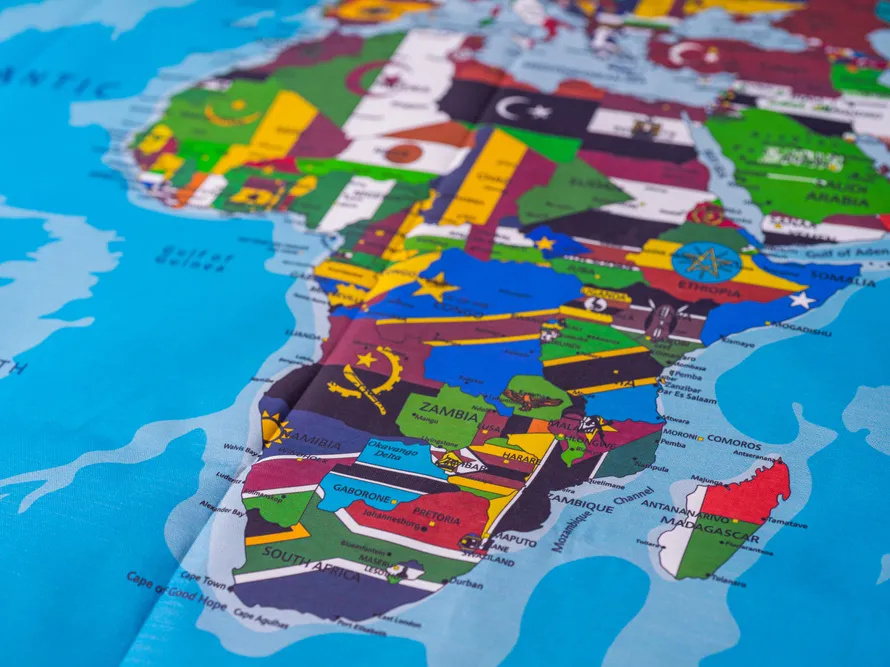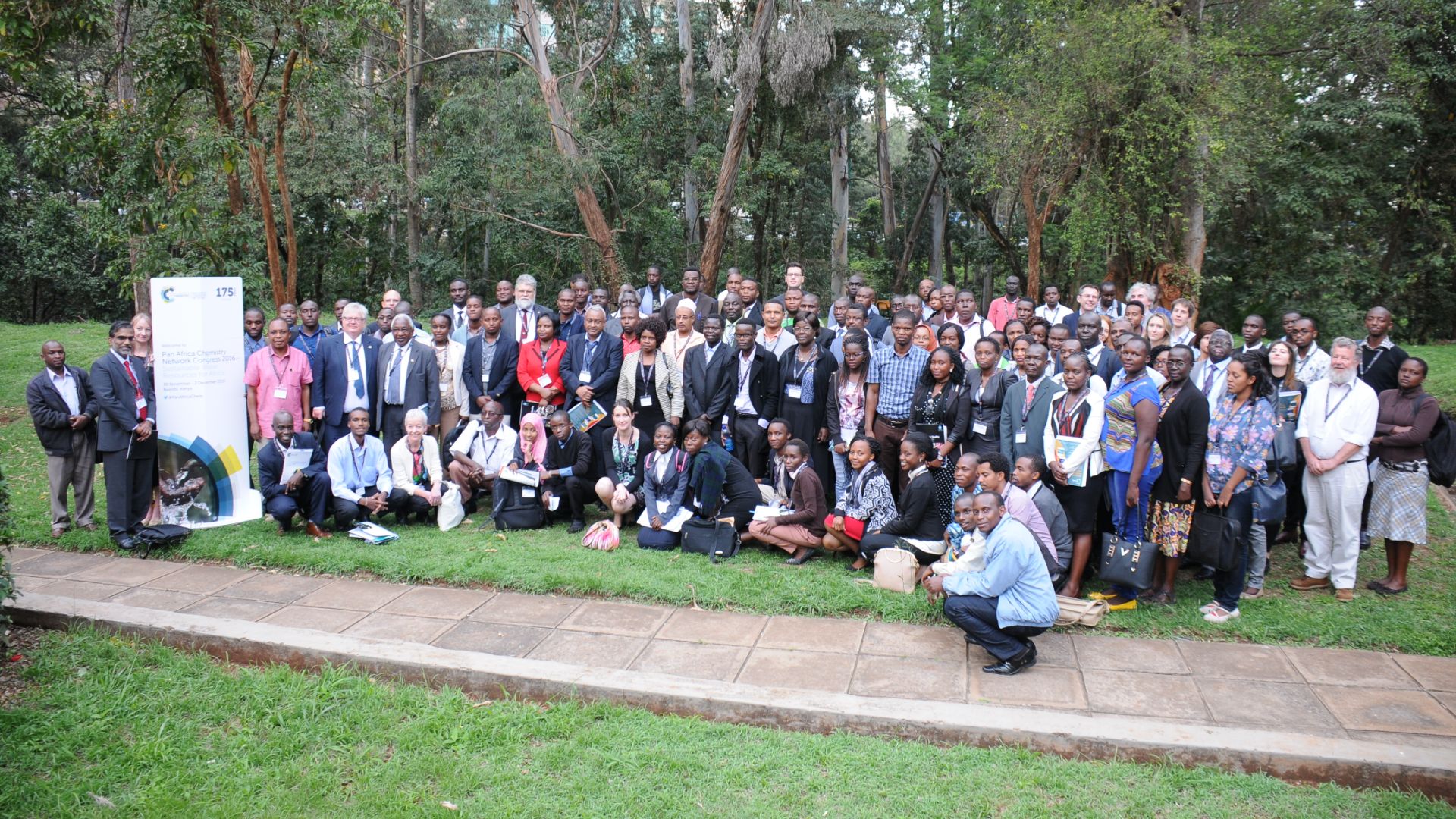The Pan Africa Chemistry Network
Building strong scientific networks across Africa and the globe

Africa is a continent of great growth and great challenges. Despite having some of today’s fastest growing economies, many African countries still face substantial challenges, such as ensuring food security, clean water and stopping the spread of disease.
The Pan Africa Chemistry Network (PACN) seeks to create a self-sustaining science base in Africa, helping to build capacity, solve local challenges and contribute to global knowledge.
Working with scientists throughout Africa, we aim to:
- Enhance and improve the skills and knowledge of the chemical science community in Africa.
- Integrate African chemistry into the global scientific community by enabling the exchange of ideas and facilitating collaboration.
- Support the community to deliver solutions to global challenges in the areas of environment, energy, food, health and water.
- Enable access to high quality chemical science journals.
On this page:
Our story and partners
Our history with Africa is intrinsically connected to the partnerships we’ve formed with leading universities, companies, international foundations and the public sector. By combining our efforts we can do even more to enhance the impact of our activities across the continent.
Since we established the PACN in 2008 with support from Syngenta, we have worked with other corporate partners including P&G and GSK, and joined forces with chemical societies, NGOs and local organisations. We have also partnered with African universities as hosts for our Hubs in Africa.
Our activities are many and varied, but all support our goal of enabling a self-sustaining science base in Africa.
Explore a list of our partners
What have we achieved so far?
Together with our partners, we’ve invested over £2.5m in African science since 2008. Explore our progress in four key areas below:
- Four international symposia in partnership with P&G and Universities in Nigeria and Kenya on water and sustainability brought together over 600 industry, academia and regulatory policy makers to discuss innovation and collaboration.
- Seven early career researchers in Kenya and Nigeria received funding and access to specialist equipment to undertake vital research into challenges such as water quality in slum communities. The additional knowledge and better equipped labs have enhanced research and individual career progression. This was supported by P&G.
- An international congress uniting scientists and policy makers led to the World Water Day report, highlighting the actions that must be taken to improve water quality in Africa.
- Project Splash with Unilever and local communities in South Africa and Kenya explored ways to recycle wastewater from laundries and develop cleaning products that use less water, enabling communities to be more sustainable.
Successful collaborations
Our meetings have inspired many successful collaborations, including one which led to WATERSPOUTT – a €3.6 million project funded by the EU which brings cheap clean water technology to rural communities in Africa.
- A series of funded research fellowships, in partnership with Syngenta, for African researchers to work towards sustainable food production has helped to build skills, experience and increase collaboration between industry and academia in Africa.
- An international conference in Ghana, in partnership with Syngenta, discussed the chemical sciences and productivity and waste.
- A conference series saw Syngenta and the international scientific community focus on the potential of Africa’s biodiversity as a benefit to agriculture, health, water, conservation and the environment. The published proceedings are available.
International conference
In 2016, we ran a UK-Ghana collaboration and international conference on materials chemistry and solar energy and in 2017, Ghana hosted the PACN Congress: "Sustainable Agriculture; How the Chemical Sciences Can Contribute to Food Security for a Growing Population”.
- Following our World Water Day report we established centres of excellence for analytical chemistry research and training at Hubs in Kenya, Ghana, Nigeria and Ethiopia. With support and donations of analytical equipment, these Hubs now coordinate our work across the continent.
- Volunteer-led GC-MS training led to more than 100 scientists from 16 African countries gaining key analytical chemistry knowledge and publishing more than 20 papers. Through a partnership with GSK, we expanded this programme to train a further 520 scientists in analytical techniques. We are also training Local Trainers to ensure long term benefit.
- Science communication training has helped many scientists in Africa to enhance their proposal writing, publishing and presentation skills.
- We support the annual Kenya Science and Engineering Fair, which gives school students the opportunity to share innovative ideas for improving Africa’s future. Over 1,000 students attend each year.
- Teacher training workshops held in Rwanda, Uganda and Ethiopia helped to inspire a new generation of chemists.
- We support the Federation of African Societies of Chemistry (FASC), who connect national chemical science communities across the continent. The new links have led to conferences, increased networking and a successful new journal – the African Journal of Chemical Education.
- A UK South Africa Newton Fund workshop for early career researchers allowed more than 30 scientists from the UK and South Africa to discuss hydrogen storage materials and build collaborative research networks.
- The PACN is helping to expand the strong network of Royal Society of Chemistry members in Africa. Currently, we have 799 members in 22 countries, with Local Sections in South Africa, Nigeria and Tunisia, plus local representatives in Ethiopia, Cameroon, DR Congo, Mauritius and others, who coordinate networking opportunities, scientific meetings and outreach work.
Our community
The Pan Africa Chemistry Network is only as strong as its community. We are building strong relationships across Africa to ensure a coherent and connected science community.
The PACN is open to anyone. Whether you are an African scientist, a company working in Africa, have research collaborations with the continent or you’re just interested in our activities, you can be part of this expanding network working towards a sustainable science base in Africa.

Our four Hubs, set up in collaboration with academic and corporate partners, focus our work across the continent.
To develop a sustainable and innovative science base, Africa needs adequately trained personnel, specialised equipment and resources to support teaching and research in the chemical sciences.
The Hubs provide regional centres for training and conferences, networking and access to some of the latest technology in key areas of chemistry. Our events and activities are open to scientists across Africa and the globe.
There are currently 799 Royal Society of Chemistry members in 22 countries across Africa, all of whom have the opportunity to join local networks as part of that membership. Royal Society of Chemistry membership can help you network with other scientists in your region, build new partnerships and get involved in the campaigns, events and activities run by our African representatives and local sections.
Access to research
Supporting the African scientific community.
All RSC journals are available through Research4Life.
As part of our commitment to supporting the chemical sciences around the globe, institutions in over 100 eligible countries have full access to our current journals, either free of charge or at low cost.
Research4Life is a partnership of the WHO, FAO, UNEP, WIPO, ILO and over 180 publishers. It aims to reduce the knowledge gap between high-income countries and low/middle-income countries by providing access to scientific research.
Full APC waiver available
Corresponding authors who are based in countries classified as Group A and Group B by Research4Life are eligible to apply for a full APC waiver for RSC Gold Open Access Journals.
Researchers in Kenya, Nigeria, Ethiopia and Ghana can also access the complete eBook collection and The Merck Index*. Researchers in Africa access around 14,000 chapters per year.
Royal Society of Chemistry membership gives you free access to the following resources:
- RSC Journals Archive: more than 260,000 articles published between 1841 and 2007.
- A journal of your choice: for professional members.
- Article downloads: up to 25 articles or eBook chapters free of charge.
- The Virtual Library: offering free access to a wide range of journals, books and databases covering the latest chemical science developments, from publishers including Springer and Wiley.
- APC Discount: 15% off our Article Processing Charge in RSC Open Access or Hybrid journals.
- Access to grants: get support to grow you research and meet future collaborators.
Funding opportunities
We offer grants to support travel, events, outreach and research, personal support and guidance.
The funding we offer is designed to support both Royal Society of Chemistry members and the wider scientific community.
Funding is available to scientists in Africa to broaden their skills base, undertake research, attend conferences and network with colleagues in other countries.
Some schemes are only open to members of the Royal Society of Chemistry, but it’s simple to join. Membership is open to all those engaged in the chemical sciences.
Explore funding opportunitiesBecome a member
Analytical Science Scholarships
If you’re working in analytical science in part of the developing world, this scholarship (run by our Analytical Division) is an opportunity to visit the UK or Ireland to acquire new skills or knowledge that would have a practical impact on your country. Unless already a member, scholars should apply for membership of the Royal Society of Chemistry and its Analytical Division within one month of the commencement of the scholarship.
Events
Join us at conferences, symposia and training workshops across Africa.
Every year, we deliver a programme of conferences and training courses to bring together the brightest minds from academia and industry, and connect the most promising young scientists to established networks.
Are you organising an event in Africa?
Including it in our events database will help you to promote it to the local and global science community.
Analytical chemistry training
Our analytical training workshops focus on key modern analytical techniques, and provide theoretical and practical training. Courses take place regularly in Ethiopia, Ghana, Kenya and Nigeria.


